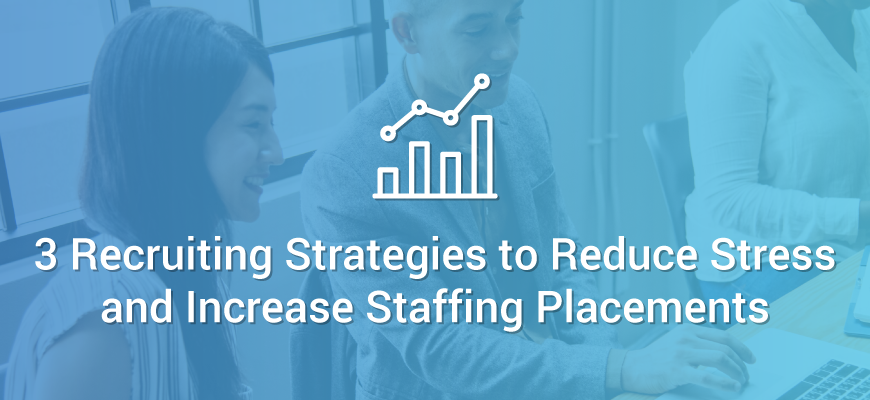The staffing industry is a fast-paced, competitive world — and it’s speeding up.
According to a recent report, 2018 Growth Hiring Trends in the United States, by our team here at Spark Hire, 77 percent of companies plan to increase their staff by 25 percent in the coming year.
To compete against other staffing firms and in-house recruiters, you need to level-up your recruiting strategies. But this is harder than it seems. You’re already overwhelmed with everyday tasks, continual networking, client demands, and the stress of deciding who is the best fit for each open role.
So who has time to sit down and re-assess recruiting strategies?
The good news is you don’t need to sit and wrack your brain for hours on complicated steps that will add more to your schedule and workload. With the right tactics, you can add advanced recruiting strategies to your plan while simultaneously reducing stress on the job.
1. Become a technical expert — fast
Staffing agency recruiters don’t have the luxury of recruiting for familiar roles. Unlike in-house recruiters, they’re tasked with being experts in various roles, fields, and industries. While you need to act fast in order to place top talent, it’s nearly impossible to successfully match candidates with roles if you don’t fully understand the technical side of various industries.
Knowing this puts a lot of stress and pressure on recruiters. Finding recruiting strategies that allow you to not only learn about complicated fields but also move quickly is a challenge.
However, taking a small amount of time to become a knowledgeable expert will reduce stress immensely. Rather than feeling like you’re interpreting clients’ cultures and specializations, you’ll feel like a confident expert.
Build this technical confidence by signing up for industry trend email updates. Organize each industry into specific folders so you’re not overwhelmed. When you find something interesting or seemingly impactful, reach out to clients to see how those trends impact their organization directly.
This will save you from the stress of last-minute shuffles, better prepares you for candidate questions, and allows you to choose candidates with the know-how of an in-house recruiter.
2. Focus on the candidate experience
External recruiters work hard to keep clients (and money) funneling in. And fast-paced fields can quickly cause employee burnout, leaving the candidate experience to suffer. When relationships are at the focal point of your recruiting strategies, however, that burnout can be significantly reduced.
Unfortunately, vague descriptions of company culture and ideal candidates create a domino effect. Relationships with candidates aren’t solidified, clients aren’t getting the candidates they need, and referrals drop.
When this happens in the staffing industry, it’s often due to recruiters feeling like outsiders looking in. And, in many scenarios, this is truly the case. No matter how hard you try, you’ll never know a company’s culture, quirks, and perks like a direct employee.
Let your recruiting strategies be proactive about this fact. Reduce your own stress by suggesting on-campus visits and interview lunches. This will help clients find the best fit for their team while reducing your stress of finding the best final placement.
3. Get a little crafty
Sometimes qualified candidates aren’t popping up as quickly as you and your team hoped. To fix that, you simply go in and alter position details and job descriptions, right?
Wrong. This isn’t the way to deal with a slow influx of qualified candidates. While in-house recruiters can get away with this, your recruiting strategies need to be a bit different — and this is a good thing.
Needing to get creative, assess the situation, and consider both client and candidate expectations makes you even more motivated and equipped to find the right fit for each position.
Head-off the frustration of exhausting talent pools with creativity. Look into your clients’ social media networks and find passionate customers. Reach out and let them know the role you’re looking to fill, why they’d be a great fit, and that you’d appreciate any referrals.
Get outside of the office and find industry-specific fundraising, networking, and awards events. These are great opportunities to connect with passive candidates are start meaningful, long-lasting relationships.
Are you taking steps to reduce staffing employee stress? Tell us how!











